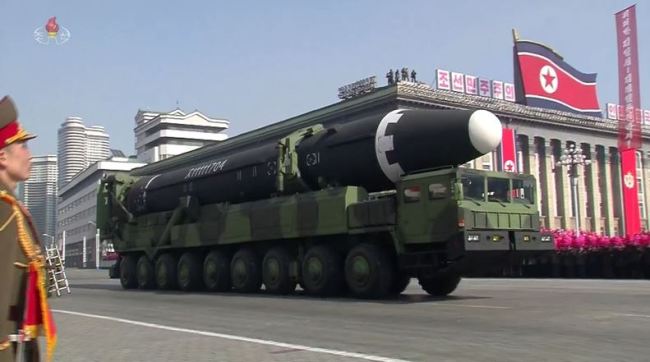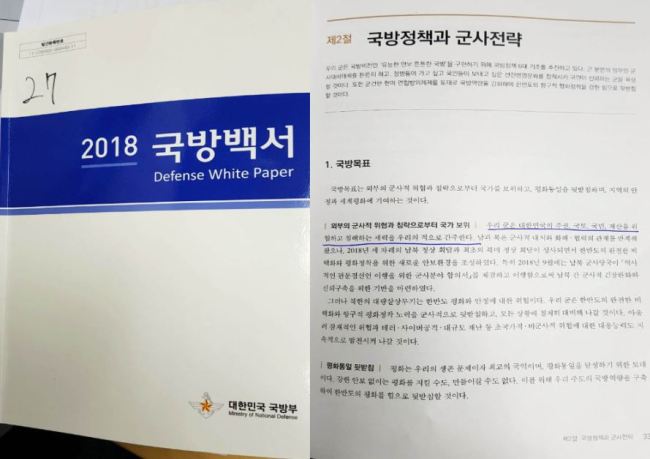January 16, 2019
Ministry also says the north has specialized battalion for assassination of key figures.
The Defense Ministry does not directly refer to North Korea as an enemy and takes a less hostile tone toward the communist state in its 23rd white paper published Tuesday.
The ministry’s latest biennial white paper — the first to be published since the Moon Jae-in administration came to power in 2017 — addresses security threats, military policies and the regional security environment.
 |
Perhaps most notably, the Defense Ministry eliminated the phrase specifically describing North Korea as South Korea’s “enemy,” a move that appears to reflect South Korea’s efforts to maintain a more peaceful mood in its dealings with the North.
The white paper defined the term “enemy” as a force that threatens and encroaches on the sovereignty of the Republic of Korea, and later said that North Korea’s weapons of mass destruction constituted such a threat, but it stopped short of explicitly labeling North Korea as an enemy.
The ministry explained in the white paper that the relationship with the North had improved as a result of last year’s three inter-Korean summits. It also highlighted the North’s promise to make efforts to achieve the denuclearization of the Korean Peninsula.
“While North Korea had previously maintained its stance of keeping its nuclear capabilities despite stringent international sanctions, it affirmed its (willingness to pursue the) denuclearization of the Korean Peninsula in 2018 and continues to make efforts to emerge from isolation by improving diplomatic relations through summits such as the North Korea-US summit.”
In its 2016 white paper, the ministry had identified the communist regime’s constant military threats and provocations as the “primary security threats” faced by the South, and stated that its regime and military would “remain an enemy insofar as they are the agents carrying out these threats.” It also said North Korea was using its nuclear capabilities to ensure its survival.
Conservatives have raised concerns that not describing North Korea as an enemy could undermine the military’s readiness posture amid the North’s lingering military threats. The two Koreas remain technically at war, as their 1950-53 conflict ended in a truce rather than a peace treaty.
 |
North Korea largely appears to have maintained the status quo in terms of its nuclear capabilities, according to the latest white paper. The ministry also estimates that North Korea has some 50 kilograms of weapons-grade plutonium — sufficient to manufacture 10 nuclear weapons — the same amount stated in the 2016 white paper.
Maintaining the assessment it had made in 2016, the ministry said that North Korea seems to possess a significant amount of highly enriched uranium and that it appears to have achieved a significant level of miniaturization of nuclear weapons.
The North also appears to have developed or to currently possess 14 kinds of ballistic missiles, including the Hwasong-15 ICBM with a range of around 10,000 kilometers. As for naval capabilities, the paper said the North appears to be constructing a 2,500-ton Gorae-class submarine capable of carrying a submarine-launched ballistic missile.
The paper also noted that the communist regime appears to have created a new operations battalion that specializes in the assassination of key figures.
Regarding defense exchanges and cooperation with neighboring countries, the report appears to reflect the souring relationship with Japan, as Seoul and Tokyo are entangled in military and diplomatic disputes.
Among the disputes are the Korean court’s ruling in favor of Korean wartime victims of forced labor against Japanese companies and an ongoing spat over Tokyo’s claim that a Korean warship locked fire-control radar on its maritime patrol aircraft in December.
“ROK and Japan are geographically and culturally close neighbors, and Japan is a partner cooperating in securing peace and prosperity of the world,” it stated this year, deleting parts of the phrase that had previously described Japan as a democratic and economic partner.
The 2016 report had said Korea and Japan share the basic values of a liberal democracy and market economy, and cooperate in securing the peace and prosperity of not only the Northeast Asian region but also the world.


